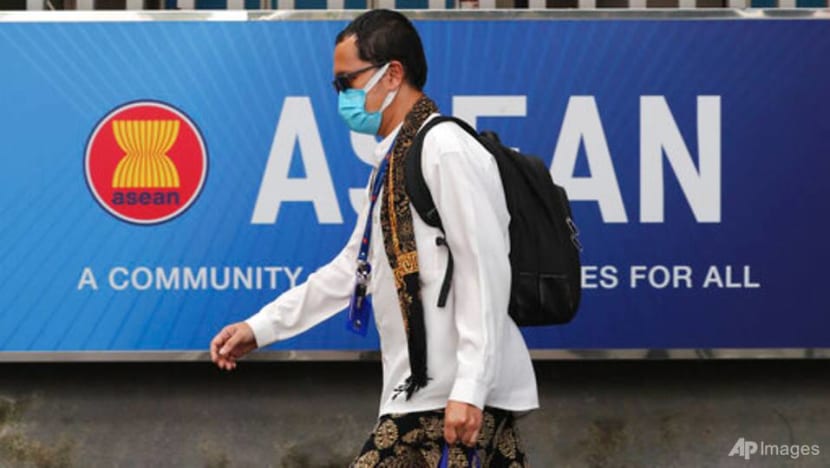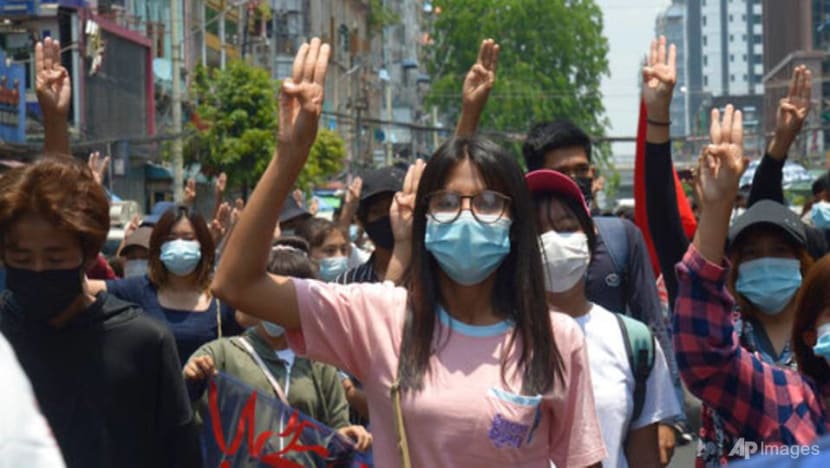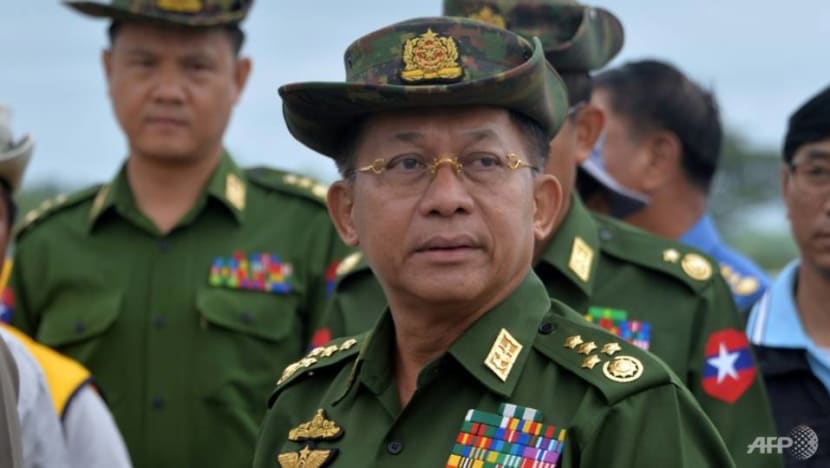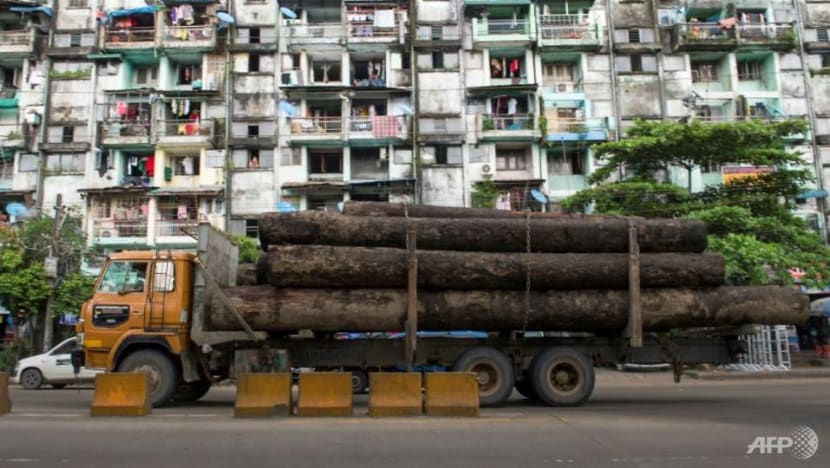commentary Commentary
Commentary: The ups and downs of ASEAN’s dealings with Myanmar
ASEAN must balance competing challenges in order to arrive at a meaningful outcome at the Special Summit, says Moe Thuzar.

(Photo: AP)
SINGAPORE: The upcoming Special ASEAN Summit on Myanmar, scheduled for Saturday (Apr 24) in Jakarta, at the ASEAN Secretariat, under Brunei’s chairmanship, has created a fever pitch of interest over who ASEAN recognises as the lawful, appropriate representative of Myanmar at this Summit.
Already, there is an outcry against the projected attendance of junta chief Senior General Min Aung Hlaing, whose State Administrative Council (SAC) continues to use lethal force against unarmed protesters, causing over 700 deaths and a situation of chaos and confusion in the country, bringing it to the precipice of instability.
In equal volume, calls have escalated for ASEAN to recognise the newly formed National Unity Government (NUG) – the alternative government with elected representatives from the 2020 general election, representatives of the democracy movement, and ethnic nationalities – as the legitimate representative of Myanmar.
READ: Commentary: Indonesia seems just a little overly concerned with Myanmar's coup
WHY ASEAN MUST STAY THE COURSE
The SAC’s and NUG’s contest for legitimacy and voice at the regional table highlights just how much is at stake for ASEAN to address the political, economic and social crisis in Myanmar caused by the unconstitutional coup of Feb 1.
The lack of appetite by many governments around the world to back up their political statements with action has resulted in a prevailing sentiment across the international community that ASEAN is the default platform and entity to deal with Myanmar.
This is not just because Myanmar is an ASEAN member. Myanmar’s instability poses a threat to regional stability, and also highlights the substantive central role ASEAN can assume to bridge any mutual suspicions among major and rising powers such as the United States and China, and to jolt or persuade other countries in Asia to join an ASEAN-coordinated response.
ASEAN must be the coordinator, as Myanmar’s current crisis underscores the need for staying the course long after the world’s attention has moved on to other crises.

MUCH RIDING ON SPECIAL SUMMIT
By now, the projected outcomes of this Special Summit have been discussed and consulted extensively in ASEAN’s policy and think-tank circles; these conversations have been picked up in media analyses and columns.
Discussion of the longer-term nature of ASEAN’s response is a tacit admission that a two-hour discussion among heads of state and government is insufficient to exhaust all options, but just enough to agree on the broad strokes of a process.
Much rides on this Special Summit to produce “tangible outcomes” to work for change in Myanmar. The choice of the word “humanitarian” may bring up memories of the 2008 Cyclone Nargis humanitarian response experience and queries whether ASEAN is following a cookie-cutter precedent.
READ: Commentary: Solution to Myanmar's political crisis lies beyond Aung San Suu Kyi or the military
READ: Commentary: Could defecting soldiers in Myanmar bring down the military?
There are some differences in 2021. The proposed “humanitarian pause” is aimed at stopping the killings, with a neutral party on the scene.
CONCERNS OVER LEGITIMACY
The presence of the United Nations Special Envoy in Jakarta to brief various ASEAN leaders attending the Special Summit will also help to identify where ASEAN and the UN could coordinate the international community’s response.
Most importantly, ASEAN’s proposed response in 2021 recognises the importance of consulting all stakeholders in Myanmar as equal, integral parts of the solution. This is important, as the controversy surrounding the SAC’s attendance at the ASEAN Summit has created a sense of betrayal among the anti-coup movement.
Even as the NUG is cognisant of ASEAN’s role and input, it is hard-pressed to explain nuances to its constituents and supporters.

The NUG’s foreign affairs team has shared that there is currently a sentiment of “great opposition” among the public to any form of mediation with what the populace at large sees as murderers.
In such a scenario, what can ASEAN feasibly do to minimise the effects of being tarred by the SAC brush?
AN ASEAN TIME-OUT FOR MYANMAR?
Suspending Myanmar’s membership has been mooted as the most effective message to send to the junta regarding the unacceptability of their actions.
ASEAN’s key political documents do not contain any criteria or conditions under which such a step may be taken, although the idea of suspension was floated by the Eminent Persons Group on the ASEAN Charter.
ASEAN’s decision-makers, however, felt suspension was “too extreme”. There is some room for creatively interpreting past precedent, however.
READ: Commentary: Myanmar learnt the wrong lessons from Indonesia’s political transition
READ: Commentary: Thailand as a model? Why Myanmar military may follow Prayuth's example
Myanmar under the State Peace and Development Council military regime was persuaded to defer its rotational chairmanship term for 2006 to focus on domestic priorities, and the Thein Sein administration’s bid in 2011 to take up the 2014 ASEAN Chair was subjected to ASEAN’s assessment first.
ASEAN may consider a working modality for when and whether a member-state may be offered a “time-out” from ASEAN meetings. This will not solve the current contest for legitimacy between the SAC and NUG, however.
CREATIVITY OVER SANCTIONS
A similar creativity may be applied regarding sanctions. ASEAN does not follow the practice of unilateral sanctions, targeted or otherwise.
However, examining ways and means of limiting economic interactions (which may be required under some of the targeted sanctions imposed by the United States, United Kingdom, the European Union and others) in connection with entities that are related to or proxies of the junta may send an equally effective message.

Were there to be sanctions imposed by the UN Security Council, ASEAN member states would follow this as a matter of international responsibility.
THE WORLD’S HOPES ON ASEAN’S SHOULDERS
The world has placed the responsibility of dealing with Myanmar on ASEAN’s shoulders, and expects nothing short of a decisive collective response to the crisis in Myanmar.
The hope now seems to be that ASEAN may once again assume the “honest broker” role from 2008 to start the process of a pause to the bloodshed in the name of humanitarian assistance for the country’s social crisis, to gain an entry point for a new kind of shuttle diplomacy that bridges the key stakeholders in Myanmar as well as the divergent positions of the other ASEAN member states.
In this important role, ASEAN needs to speak with one voice. For now, the process presents both pitfalls and promise.
READ: Commentary: ASEAN can do better on Myanmar this time
READ: Commentary: Defiance in Myanmar’s diplomatic ranks threatens the military’s power
ASEAN as a collective whole faces the challenge of bridging the divergent interests of individual member states on balancing the need to discuss with the recalcitrant SAC regime the consequences of its actions since February, and to consult and consider the views and position of the NUG which has the broad-based support of the people and communities protesting against the coup in and outside Myanmar.
To be clear, any process on Myanmar will not constitute a return to pre-coup conditions.
The current crisis, the rare political and social awakening transcending class, politics, ethnicity and religion across the country, and the senseless bloodshed by a brutal military junta, underscore that there is no stepping back into the same stream or current.
Moe Thuzar is Co-coordinator of the Myanmar Studies Programme at the ISEAS-Yusof Ishak Institute.














